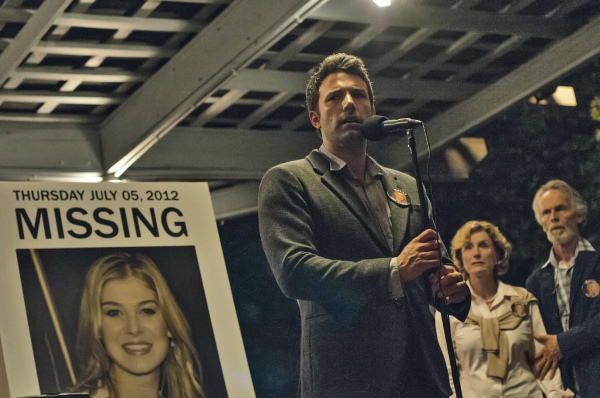“Gone Girl” opens Friday at Point, Eastgate, Star Cinema, Sundance and Cinema Cafe: R, 2:25, three and a half stars out of four.
He’s a bad husband. She’s a good wife. They have a good marriage. “Gone Girl” is first and foremost an absolutely delicious mystery, one that parcels out revelations and surprises at just the right moments to keep us hooked. But dig deeper, and it’s also a movie about the stories we tell ourselves, about ourselves, whether it’s on cable news or in the privacy of our own homes. And how those narratives are so powerful that we’d rather change ourselves to fit the story than change the story to fit ourselves. He’s a good husband. She’s a bad wife. They have a bad marriage.
When we first meet Nick Dunne (Ben Affleck), we can’t tell anything about him. He’s just a handsome guy, standing outside his McMansion in his dying hometown of Carthage, Missouri. He heads into town to the bar he owns with his twin sister Go (an excellent Carrie Coon, a UW-grad and American Players Theatre vet), to drink bourbon and play The Game of Life. Nick’s own life looks like it’s stuck on one of those plastic hills in the game, with only two little pegs in his plastic car.
But later, he comes home to find his wife Amy (Rosamund Pike) missing. And right then we start trying to read Nick. Is he worried? Is he worried enough? In Affleck’s very canny performance, Nick is as opaque to us as he is to the detectives (amusing played by Kim Dickens and Patrick Fugit) who come to look into the disappearance. Is Nick hiding something? Or does he just not know how to behave as if he isn’t?
The first few days of Amy’s disappearance are intercut with scenes of Amy writing her diary, remembering the first few years of her life with Nick. Their courtship starts off almost impossibly romantic, including a first kiss inside a “sugar storm” swirling outside a bakery loading dock, but soon after marriage, dark flashes intrude on the perfect couple. Money problems, family health problems, a move from New York to Carthage, all drive wedges within the marriage. Nick grows distant, than violent. Amy buys a gun for protection. It’s not a story that squares with the Nick we think we know. But it doesn’t not square, either.
Of course, the legions of readers of Gillian Flynn’s novel (she also wrote the screenplay) already know where this is going; I haven’t read the book, but I had an inkling too. I don’t think that robs “Gone Girl” at all of the pleasure of watching it unfold on the big screen, how Flynn and director David Fincher skilfully spin such a salacious yarn while also exploring the emotional depths beneath its mass-market paperback surface. The movie plays out as a series of cat-and-mouse games, but none bigger than the one we see in the power struggle of a seemingly ordinary marriage, each wrestling for control of the narrative.
“Gone Girl” is also a pitch-perfect, at times very funny media satire, as the TV trucks pull up outside Nick’s house, and the investigation becomes nightly fodder for a Nancy Grace-like cable squawker. Suddenly, every fact of Nick’s life adds to a mountain of evidence that he’s probably guilty. When Nick finally agrees to an exclusive interview with a network star (Sela Ward, Diane Sawyering it up all over the place), he’s become an expert at playing the game. “First they dislike me, then they like me, then they hate me, then they love me,” he tells his sister.
Fincher directs with his usual, near-sinister fluidity — he seems to enjoy the challenge of reveling in the trashier elements of the story while honoring the psychological complexity — and the score by Trent Reznor and Atticus Ross is appropriately creepy, adding a shiver to even the most benign-seeming scenes. The excellent supporting cast includes Neal Patrick Harris as a creepy ex-boyfriend of Amy’s and Tyler Perry (yes, Madea) as a celebrity defense attorney who seems perfectly at ease inside the media circus.
Writing about “Gone Girl” without spilling its secrets is like walking a tightrope, because its secrets are so central to its meaning. But if you don’t know what they are, it’s worth going to the theater to see them spill out. And if you have the read the book and do know, it’s still worth going to see how cleverly it’s done.

